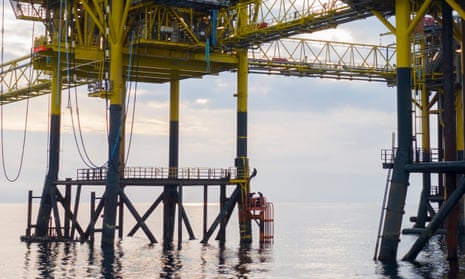Denmark has brought an immediate end to new oil and gas exploration in the Danish North Sea as part of a plan to phase out fossil fuel extraction by 2050.
On Thursday night the Danish government voted in favour of the plans to cancel the country’s next North Sea oil and gas licensing round, 80 years after it first began exploring its hydrocarbon reserves.
Denmark’s 55 existing oil and gas platforms, scattered across 20 oil and gas fields, will be allowed to continue extracting fossil fuels but the milestone decision to end the hunt for new reserves in the ageing basin will guarantee an end to Denmark’s fossil fuel production.
“We’re the European Union’s biggest oil producer and this decision will therefore resonate around the world,” Denmark’s climate minister, Dan Jørgensen, said. “We are now putting a final end to the fossil era.”
Helene Hagel from Greenpeace Denmark described the parliamentary vote as “a watershed moment” that will allow the country to “assert itself as a green frontrunner and inspire other countries to end our dependence on climate-wrecking fossil fuels”.
She said: “This is a huge victory for the climate movement and all the people who have pushed for many years to make it happen.”
Denmark began oil and gas exploration in 1972, and its North Sea revenues helped to make it one of Europe’s richest nations. In the last decade the government has turned its focus to clean energy, including offshore wind farms built by the country’s former state oil company, which has rebranded from Dong Energy to Ørsted.
The Danish government estimates that the decision to phase out oil and gas production will cost the government coffers DKr13bn (£1.6bn) in lost revenue.
Denmark produced the equivalent of 103,000 barrels of oil and gas a day in 2019, compared with the UK, which produced 1.7m barrels of oil equivalent last year and Norway, which produced 1.8 million barrels a day.
Its decision to set a long-term deadline on oil and gas production is likely to pile pressure on the UK prime minister, Boris Johnson, to follow suit as the country prepares to lead efforts to tackle the climate crisis at the UN climate talks in Glasgow next year.
“This is what climate leadership looks like,” Mel Evans, a senior climate campaigner for Greenpeace UK, said. “All eyes will be on the UK next year as we host crucial climate talks, so our prime minister should take note. If Johnson wants to keep up and build global momentum for the clean energy transition, he must cancel the next round of oil and gas licensing, end all future exploration and ditch the legal requirement to extract as much as possible from the North Sea basin.”
Denmark is the second European nation to call an end to new oil and gas exploration, but the first major fossil fuel producer. In 2017 France became the first country in the world to phase out exploration and production on its mainland and overseas territories by 2040. New Zealand followed suit a year later by bringing an end to all new oil and gas exploration permits.
The IPPR thinktank called on the UK and Scottish governments earlier this week to phase out oil and gas production through a series of declining five-year targets, and scrap a controversial policy that calls on North Sea companies to extract as much oil and gas as they can from the ageing basin.
Deirdre Michie, the chief executive of Oil and Gas UK, told the Guardian that a hard deadline on oil and gas production – similar to the ban on the sale of new fossil fuel vehicles from 2030 – would be a “blunt instrument” that could lead to “unintended consequences” for investment and thousands of jobs which rely on the sector.
